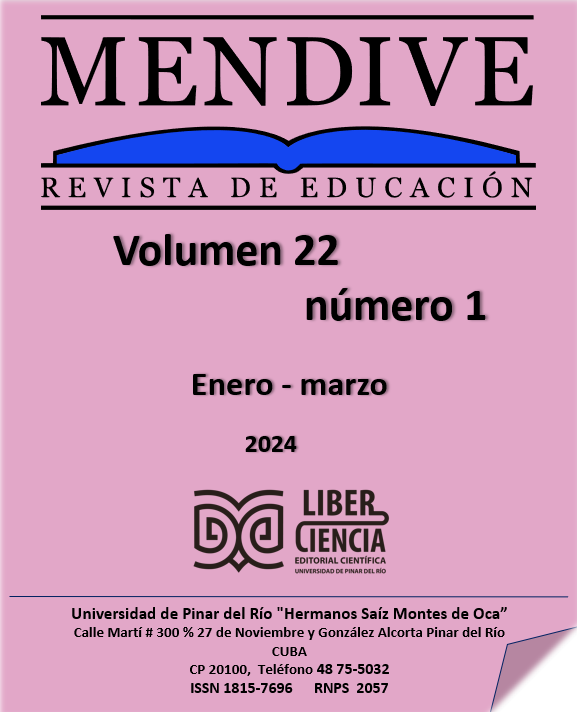Perspectivas de la educación inclusiva desde la Dirección Provincial de Educación
Contenido principal del artículo
Resumen
Llevar a cabo un proceso de inclusión educativa de calidad en las sociedades actuales constituye un reto que parte de pugnar maneras discriminatorias de exclusión en diferentes contextos y por disímiles causas, en las que concurren paralelamente los factores de riesgos, la falta de preparación de los implicados en las búsqueda de soluciones y la asimilación de los educandos ante la ayuda. En tal sentido el artículo presenta un estudio acerca de la preparación de los metodólogos provinciales de educación para la atención a educandos en situación de vulnerabilidad desde un enfoque inclusivo. Se emplearon en su elaboración métodos teóricos como el análisis histórico-lógico, la inducción-deducción y el análisis-síntesis; métodos empíricos como el análisis documental, la entrevista y la observación a actividades metodológicas; y técnicas estadísticas como el análisis porcentual. Entre las principales limitaciones encontradas estuvieron las insuficiencias en la proyección de prácticas socio-educativas inclusivas desde el sistema de trabajo metodológico de la Dirección Provincial de Educación; actualmente no existe un sistema armónicamente diseñado que permita convertir los sistemas educativos en respuesta a la diversidad de educandos y hacer verdaderamente práctico el derecho a la educación con igualdad de oportunidades, en especial aquellos que por estar en situación de vulnerabilidad en ocasiones son excluidos. Se pudo concluir que los metodólogos juegan un papel fundamental en la dirección del proceso de prevención, detección, estimulación, diagnóstico/evaluación e intervención temprana de educandos con barreras para el aprendizaje y la participación social.
Descargas
Detalles del artículo

Esta obra está bajo una licencia internacional Creative Commons Atribución-NoComercial 4.0.
Citas
Arnaiz, P.; de Haro, R. y Maldonado, R. (2019). Barriers to student learning and participation in an inclusive school as perceived by future education professionals. Journal of new Approaches in Educational Research, 8(1), 18-24. DOI: 10.7821/near.2019.1.321.
Castro, L., García, C. y López, R. (2020). Exclusión social, inclusión política y autoestima de jóvenes en pobreza, Monterrey, México. Revista de Ciencias Sociales (RCS), XXVI(1), 38-50, FCES LUZ, ISSN: 1315-9518, ISSN-E: 2477-9431
Carrillo, C., y Moscoso, D. (2022). La inclusión educativa y atención a la diversidad en educación. Ciencia Latina Revista Científica Multidisciplinar, 6(5), Article 5. https://doi.org/10.37811/cl_rcm.v6i5.2908
Cervantes, E. (2019). Un Acercamiento a la Formación de Docentes como Investigadores Educativos en México. REICE: Revista Iberoamericana sobre Calidad, Eficacia y Cambio en Educación, 17(4), 59-74.
García, L., Vigoa, Y., Álvarez, D. y Quijije., H. (2021). Una mirada a la inclusión como oportunidad de desarrollo. UNESUM-Ciencias: Revista Científica Multidisciplinaria, 5(6 Especial Ingenierías), 95-100. ISSN 2602-8166
Llópiz, K., Pérez, D. y Rodríguez, B. (2020). Preparación para la vida adulta independiente: Un camino para promover la inclusión socioeducativa de escolares con necesidades educativas especiales. Propósitos y representaciones, 8(Extra 3), 4.
López, M., Vidal, M., y López, S. (2022). Tendencias actuales sobre estrategias para la inclusión educativa de alumnado con Trastorno del Espectro Autista (TEA). MLS Inclusion and Society Journal, 2(1), Article 1. https://doi.org/10.56047/mlsisj.v2i1.1318
MINED (2014). Reglamento de trabajo metodológico del Ministerio de Educación. La Habana: MINED. https://www.moron.gob.cu/images/PDF/nuestraRegion/Educaci%C3%B3n/Direcci%C3%B3n_Municipal /RESOLUCION_No._200-14.pdf
Ravelo, L., y Bonilla, I. (2022). La cultura inclusiva en la formación inicial del Licenciado en Educación Pedagogía-Psicología. Revista Conrado, 18(86), Article 86.
Reinoso, E. y Ramírez, E. (2020). La inclusión educativa en el contexto de la educación cubana. Revista de Investigación, Formación y Desarrollo: Generando Productividad Institucional, 8(3) DOI: https://doi.org/10.34070/rif.v7i1
Reyes, R. y Prado, A. (2020). Information and Communication Technology as Tools for Inclusive Education Systems in Elementary Schools. Revista Educación, 44(2), 506-525.
Robles, A. (2021). Educación inclusiva, medio y propósito de la educación para todos. Boletín Redipe, 10(1), 173-184.
Rodríguez, O., Casalis, A. y Armas,M. (2021). La inclusión socioeducativa de niños y adolescentes con discapacidad intelectual. Revista de Gestión del Conocimiento y el Desarrollo Local, 8(2), 81-91. ISSN-e: 2707-8973
Sandoval, M., Simón, C., y Márquez, M. (2019). ¿Aulas inclusivas o excluyentes?: Barreras para el aprendizaje y la participación en contextos universitarios. Revista Complutense de Educación, 30(1). https://doi.org/10.5209/RCED.57266
Valdés, R. A., López, V., y Jiménez, F. (2019). Inclusión educativa en relación con la cultura y la convivencia escolar. Educación y Educadores, 22(2), Article 2. https://doi.org/10.5294/edu.2019.22.2.2


